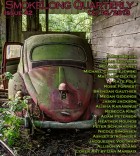What drew me to your story was its evolving surprise. There is no guessing what’s going to happen next. It feels in the genre of absurdist literature where nothing is exactly what it seems and yet it is exactly what it seems. Please talk about how this piece came about?
The piece arose from the personification of a balloon, animated metallic losing of its mass and sinking. I became accustomed to seeing this object which loomed around the ceilings as a family member, living and breathing, almost human. My son took the balloon out of the house—but always brought it back—and the balloon was loved until it grew old and lost its majesty. It took more than a week to sink, and it hid behind chairs where once it rode the roof from room to room, borne by the ceiling fan, where it bounced violently, but not fatally. It hovered above the floor, where I pitied it, and it pitied me. It then hung loosely around furniture; less conspicuous, ashamed, and almost forgotten. I wanted the grandfather to hold onto a string of reality, through hallucinations, or the aging process taking shape, always changing everything from its previous form. I aimed for something sort of absurdist and atavistic, but not beyond the threshold of suspension of disbelief.
Interesting how you give us “grandpa” last. After the narrator, the Dad and Mom, the dog, the baby, and the grandma are introduced, we meet him: “Grandpa assembled the crib.” You give us his context before he arrives. Did the story grow from him?
I think he evolved from the story, though the story initially was intended to revolve around the baby, at least in the beginning. This tale was about the loss of an infant, but also the loss of the family. I needed to show how the baby affected everyone, changed them. The infant impacted the house. The story usually ends up someplace unimaginable at the beginning—at least in my case—so I let the narrative evolve by itself naturally without too much reflection or prerequisite character development. I try to let the subconscious language control every story, to let character development and plot evolve from the words, which should fit the piece like a puzzle. A character or story can be twisted dramatically with the change of one word. Sometimes this works, sometimes it does not.
The surprise in this piece comes from your process. Ron Carlson talks about this in Ron Carlson Writes a Story: “The story isn’t going to talk to you, but things are going to happen in the heat of writing that cannot be predicted from outside the act itself.” This is the open door to surprise. You have opened that door. How has your process developed over your writing career? What do you know now you didn’t know then?
I used to have everything all figured out like a blueprint to a house. Now, I try not to over-think things. I never outline story drafts because that draws too much restriction. I try to embrace that ethereal place in the bottom of the mind where stories come from and let the sentences emerge from that emptiness. Thinking is the worst deterrent to writing. I learned that there are depths beyond that door. I think it is an invisible passage. I try to fish as deeply into my subconscious as possible, focused on individual words. I know sometimes where I am going and there are some things that will happen, but it is not a linear journey, and should not be. By getting from point A to point B, there are so many more points in-between that cannot be seen, and you should try to make the reader feel some of these points.
What do you read most, fiction or nonfiction and who do you read? Who’s influenced you the most?
I read more fiction, though I try to read as much narrative nonfiction as possible. I read whatever I can get my hands on. I am most influenced by F. Scott Fitzgerald, Hunter S. Thompson, Raymond Carver, and Denis Johnson.
Tell us a little about what you’ve written in the past and where you’re going now?
In the past, I have written bursts of short fiction, and some narrative nonfiction. I am trying to stay focused on writing novels now. My first novel, The Ritalin Orgy, was recently published by Perpetual Motion Machine Publishing. I hope to have more novels published in coming years, and some short story collections. I am desperately trying to improve as a writer. Death will open its beaches and invite me for a swim. I am going for lunch.
One last question, what advice would you give to a new writer starting out?
Read as much as possible, and everything, not just the stuff you enjoy or the requirements assigned by teachers. Write every day, even if it means dropping out of society or having no social life or no job. Do not edit. Just write. It may take years to find your own style. Write and live and die by your effort. Do not let anybody interfere with your writing, but do not be a curmudgeon to your children or spouse or significant other, or anybody. Do not be afraid to starve penniless for a few days. Do not fear failure or rejection, as both are inevitable. Do not be afraid to ask neighbors and friends for food. If you are writing, and persistent enough, you will get your work out eventually, if it is good enough, then you can buy your groceries. One day, you can tell the story of how you starved and struggled, as an aspiring writer, and this is something not every artist can brag about.



 The core workshop of SmokeLong Fitness is all in writing, so you can take part from anywhere at anytime. We are excited about creating a supportive, consistent and structured environment for flash writers to work on their craft in a community. We are thrilled and proud to say that our workshop participants have won, placed, or been listed in every major flash competition. Community works.
The core workshop of SmokeLong Fitness is all in writing, so you can take part from anywhere at anytime. We are excited about creating a supportive, consistent and structured environment for flash writers to work on their craft in a community. We are thrilled and proud to say that our workshop participants have won, placed, or been listed in every major flash competition. Community works.